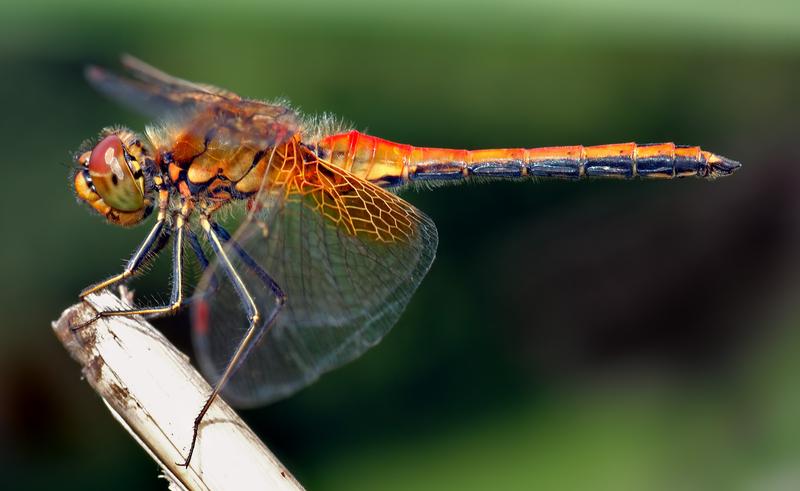

The Yellow-Winged Darter (Sympetrum flaveolum) is one of the proposed species that may be appropriate as a flagship for species diversity in freshwaters.
© André Karwath
“A disproportionately large number of species living in lakes, rivers and wetlands are at risk of extinction, and are in particular need of protection,” stressed IGB researcher Dr. Gregor Kalinkat, one of the authors of the appeal in the journal Conservation Biology. This is confirmed by current figures: according to the Living Planet Report 2016 by the World Wildlife Fund (WWF), populations of freshwater species shrank by 81 per cent between 1970 and 2012. In their appeal, the authors call for the definition of freshwater flagship umbrella species and for the development of targeted conservation measures.
The term ‘flagship umbrella species’ combines two established concepts from conservation biology: the main idea behind the ‘flagship’ role is to raise public awareness, paving the way for conservation measures, e.g. through donations. The panda is the most well-known example of a flagship species; for years, the bear with striking black-and-white coloration has been used as an advertising emblem for the protection of endangered species. ‘Umbrella species’ are species whose protection indirectly benefits many other species. One example is the Amur tiger in East Siberia, whose conservation also helps protect bears, deer and other species.
From pandas to mussels: scientists name freshwater flagship species
In developing new conservation concepts, it is important to consider animal and plant species that have until now been neglected, which play a particular role in their respective ecosystem, and to expand the scale of species worthy of protection: from single-cell organisms to vertebrates.
The authors discuss a number of criteria for flagship umbrella species, and identify a total of over 60 species that could serve as ‘freshwater pandas’. These species include the European Sturgeon, a bony fish that IGB has been helping to reintroduce in Germany for years; the Freshwater Pearl Mussel, a critically endangered large native mussel that needs clean water and can live for up to 80 years; and the Yellow-Winged Darter, whose colourful body makes it easy to recognise.
Researchers call for better data and close cooperation between researchers and practitioners
In addition, better species protection requires better data – although the current data pool has improved significantly in recent years, particularly for freshwater species, it continues to be inadequate. “To date, a disproportionately large amount of research and scientific data material has been collected on land and for marine species. In order to protect freshwater species, we are in urgent need of more comprehensive data, which can be collected both cost-effectively and extensively using innovative methods,” reported Dr. Gregor Kalinkat. These newly developed molecular methods (e.g. environmental DNA) can be used, for instance, to determine the existence of fish or amphibian species from simple water samples, which in the past needed to be collected painstakingly by hand or using nets.
The scientists emphasise in their appeal that researchers and practitioners must collaborate more closely in order to implement extensive conservation measures for freshwater species. In light of this, ‘freshwater pandas’ require more than just effective concepts – targeted species protection is dependent on the support of as many actors as possible around the world.
Link to study:
http://onlinelibrary.wiley.com/doi/10.1111/cobi.12813/full
Contact person:
Dr. Gregor Kalinkat
Leibniz-Institute of Freshwater Ecology and Inland Fisheries (IGB)
Müggelseedamm 310, 12587 Berlin
Email: kalinkat@igb-berlin.de
Phone +49 30 641 81 707
About IGB:
Work at IGB combines basic research with preventive research as a basis for the sustainable management of freshwaters. In the process, IGB explores the structure and function of aquatic ecosystems under near-natural conditions and under the effect of multiple stressors. Its key research activities include the long-term development of lakes, rivers and wetlands under rapidly changing global, regional and local environmental conditions, the development of coupled ecological and socio-economic models, the renaturation of ecosystems, and the biodiversity of aquatic habitats. Work is conducted in close cooperation with universities and research institutions from the Berlin/Brandenburg region as well as worldwide. IGB is a member of the Forschungsverbund Berlin e.V, an association of eight research institutes of natural sciences, life sciences and environmental sciences in Berlin. The institutes are members of the Leibniz Association.












